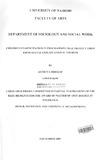Children's participation in programmes that protect them from sexual exploitation in tourism
| dc.contributor.author | Mirikau, Agnetta | |
| dc.date.accessioned | 2012-11-13T12:35:44Z | |
| dc.date.available | 2012-11-13T12:35:44Z | |
| dc.date.issued | 2009 | |
| dc.identifier.uri | http://erepository.uonbi.ac.ke:8080/handle/123456789/5179 | |
| dc.description.abstract | The focus of this study was to find out if children are participating in programmes which are aimed at protecting them from sexual exploitation in tourism in Mombasa District of the Coast Province as it has been a major concern. Participation is the process of respecting the right of children to express their views and have those views taken into account. Due to growth of child sex tourism in Kenya there is need to involve children as part of the solution to the problem. There is inadequate information on children's participation within programmes and misconception about children's participation as a strategy for protection. The specific objectives were: to establish the effect of children's level of education on their participation; to establish the effect of the activities undertaken in rehabilitation programmes on children's participation; to find out the effect of the presence of parents in a child's life on his or her participation; to determine the influence of programme staff on children's participation and to find out the level of children's awareness of their right of participation in rehabilitation programmes. The study was guided by two theories namely; Rational choice theory as espoused by George Homans and Symbolic interaction theory which was founded by George Hebert Mead. The rationale for using these theories is explained by their relevance to the subject of the study. Rational choice theory explains that there are several factors which influence the child, leading him or her to exercise or not exercise the right of participation. Symbolic interaction theory explains that the meanings which children give to situations and the. interpretations that they make of social actions and events are crucial to their participation. Both quantitative and qualitative data were used whereas primary data was collected using personal interviews to get quantitative data and Key informant interviews and focus group discussions provide qualitative data.: Secondary data was obtained through desk research and review of literature related to children's participation. This study was undertaken in Mombasa district which selection was based on its high population of girls below eighteen years who are in child sex tourism. The target population for this study was child sex workers in the tourism sector who are 'in rehabilitation programmes which were purposively selected from the Mombasa District Action Plan on Preventing and responding to child sex tourism 2008-2010. The study employed both simple random sampling and purposive sampling to select children who had been exposed to sexual exploitation as they were the subject of this study. The total target population was 300 children out of which only 257 children were interviewed. Data was analyzed using Statistical Package for Social Sciences (SPSS) software. Findings from the study reveal that; the level of children's education has an impact on vulnerability to sexual exploitation. Children with primary level of education are more vulnerable, which can be attributed to their limited capability of making informed decisions to protect themselves due to their limited life experiences. The level of education is significant in children's participation signified by their expression of opinion. The activities in which the children participate while in the rehabilitation programmes influence their participation in the programmes. Most of the children in the programmes were participating in both educational and non-educational activities. The staff in the programmes contribute to the decisions made by children in that their effectiveness and efficiency determines children's participation. Age more than level of education played a pivotal role in knowledge about children's rights including their right of participation. | en_US |
| dc.language.iso | en_US | en_US |
| dc.publisher | University of Nairobi, Kenya | en_US |
| dc.title | Children's participation in programmes that protect them from sexual exploitation in tourism | en_US |
| dc.title.alternative | Thesis (MA) | en_US |
| dc.type | Thesis | en_US |

